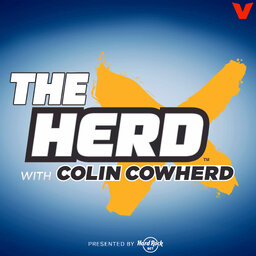Best of The Herd
After winning another NBA championship the Celtics broke a tie with the Lakers for most titles in league history, Colin explains why this is so impressive for Boston considering some of the advantages Los Angeles has. He believes Caitlin Clark is the best player in the history of the WNBA in terms of business even if she's a not a great player on the court yet. Plus, 7-time Super Bowl champion Tom Brady joins the show in studio to talk about his transition into broadcasting for Fox Sports.
In 1 playlist(s)
The Herd with Colin Cowherd
The Herd with Colin Cowherd is a thought-provoking, opinionated, and topic-driven journey through th…Social links
Follow podcast
Recent clips

Best of the week on The Herd
38:45

THE HERD - Hour 3 - Greg Jennings stops by The Herd
33:46

THE HERD - Hour 2 - Ranking the top QBs in the NFL playoffs, did Dante Moore make a mistake?
42:46
 The Herd with Colin Cowherd
The Herd with Colin Cowherd